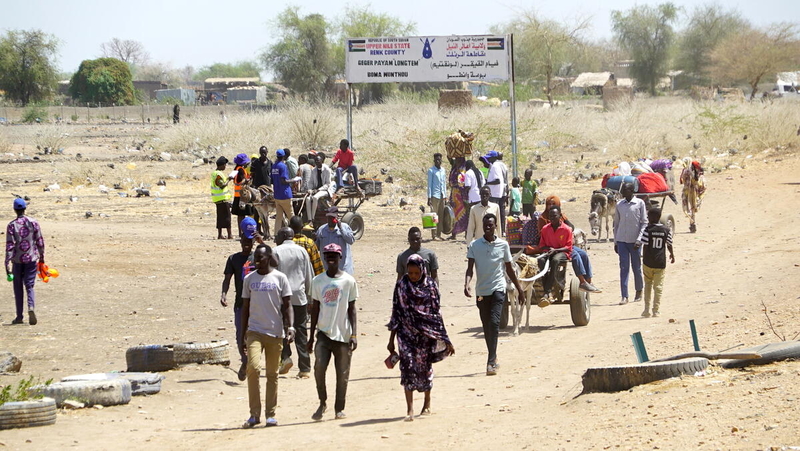The United Nations World Food Programme (WFP) has warned Wednesday that an additional 2 - 2.5 million people in Sudan are expected to slip into hunger in the coming months as a result of the ongoing violence in the country. This would take acute food insecurity in Sudan to record levels, with more than 19 million people affected, two fifths of the population.

© WFP/Peter Louis
WFP said the biggest spikes in food insecurity are expected in West Darfur, West Kordofan, Blue Nile, Red Sea and North Darfur states. Meanwhile, the cost of food is soaring all across the country, and the price of basic food items is expected to increase by 25 percent in the next three to six months. If farmers are prevented from accessing their fields and planting key staples between May and July, it will drive food prices even higher.
Insecurity and violence had forced WFP to temporarily pause its operations in Sudan, but it has restarted them on May 1 and since last week has reached over 35,000 people with lifesaving food. The UN agency had paused its work in the country after three staff members were killed in North Darfur on April 15 - the first day of the conflict between Sudan’s army and a paramilitary unit, the Rapid Support Forces (RSF).
WFP operations are focused on assisting a total of 384,000 people, including families who have recently fled the conflict, pre-existing refugees and internally displaced people and the vulnerable communities hosting them across Gedaref, Gezira, Kassala and White Nile states.
Additionally, the WFP-managed UN Humanitarian Air Services (UNHAS) is starting regular air connections between Port Sudan and Addis Ababa, Ethiopia facilitating the safe transportation of frontline humanitarians and critical aid.
In a related development Wednesday, the European Union (EU) launched a Humanitarian Air Bridge transporting critical supplies to relief agencies in Port Sudan. The 30 tons of relief items, including water, sanitation and hygiene as well as shelter equipment were transported from the warehouses of the United Nations in Dubai to Port Sudan. Upon arrival, they were handed over to WFP and the United Nations Children's Fund (UNICEF), the European Commission said in a statement.
In the coming months, WFP will scale up its emergency assistance to support 4.9 million vulnerable people in areas where the security situation allows, in addition to preventing and treating moderate acute malnutrition for 600,000 children under five and pregnant and breastfeeding women.
Prior to the outbreak of conflict, WFP had a funding gap of more than US$300 million for its life-saving operations, and the needs are expected to rise significantly with the crisis.
The conflict has triggered large-scale displacement within and outside Sudan. At least 850,000 people have been displaced by the fighting between the Sudanese armed forces (SAF) and the paramilitary Rapid Support Forces (RSF) that started more than three weeks ago. The International Organization for Migration (IOM) said Tuesday, more than 700,000 people are now internally displaced by the fighting. At least 150,000 women, men, and children needing basics like shelter, food and water have fled to neighboring countries, according to the UN Refugee Agency (UNHCR).
WFP is also supporting immediate needs in host countries, including Chad, Egypt, South Sudan, and the Central African Republic. The UN agency is providing emergency food assistance to those fleeing the crisis in Sudan.
In view of the rising humanitarian needs due to the raging conflict in Sudan, WFP called on all parties to the conflict to take immediate steps to stop the fighting and facilitate the humanitarian access so that it can scale up our operations in a country with some of the highest rates of food insecurity in the world.
The EU has strongly urged all warring parties for a full compliance with international humanitarian law, including protection of civilians and humanitarian space. The supranational organizations said safety and security of aid workers, premises and assets must be guaranteed so that they can provide emergency assistance to those affected.
Violent armed clashes broke out in Sudan on 15 April between the Sudanese Armed Forces and the Rapid Support Forces. This development came following a prolonged political gridlock after the 2021 military coup. Prior to the outbreak of violence, the political, security and economic instability, combined with a poor harvest, led to the worst humanitarian crisis in a decade.
Hostilities between the SAF and the RSF have continued uninterrupted for 27 days now. Delegations from both sides have been meeting in Saudi Arabia for almost a week, but the talks have so far failed to produce any results.
According to the latest reports by the Sudanese Ministry of Health, as of 9 May, at least 604 people have been killed and 5,127 others injured since the fighting erupted. However, some states in Sudan are not reporting figures, and the actual toll is expected to be much higher.
Humanitarian needs in Sudan were already at record levels before the situation deteriorated, with some 15.8 million people – about a third of the population – requiring humanitarian assistance. A quarter of Sudan's population - 11.7 million people - were severely food insecure.
Before the fighting started, Sudan hosted about 1.2 million refugees, one of the largest refugee populations in Africa, some 3.7 million Sudanese were internally displaced, mostly in the Darfur region that has experienced a volatile security situation since 2003. More than 800,000 Sudanese had fled to neighboring countries.
Further information
Full text: Hunger set to hit record high in Sudan as fighting continues, WFP, press release, May 10, 2023
https://www.wfp.org/news/hunger-set-hit-record-high-sudan-fighting-continues
Full text: Sudan: EU launches Humanitarian Air Bridge to provide essential supplies, European Commission, press release, May 10, 2023
https://ec.europa.eu/commission/presscorner/detail/en/IP_23_2641